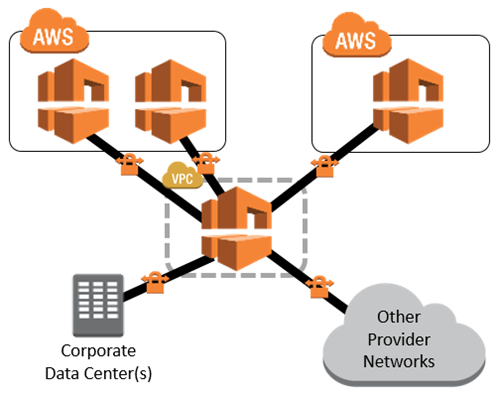AWS News Blog
AWS Solution – Transit VPC
Today I would like to tell you about a new AWS Solution. This one is cool because of what it does and how it works! Like the AWS Quick Starts, this one was built by AWS Solutions Architects and incorporates best practices for security and high availability.
The new Transit VPC Solution shows you how to implement a very useful networking construct that we call a transit VPC. You can use this to connect multiple Virtual Private Clouds (VPCs) that might be geographically disparate and/or running in separate AWS accounts, to a common VPC that serves as a global network transit center. This network topology simplifies network management and minimizes the number of connections that you need to set up and manage. Even better, it is implemented virtually and does not require any physical network gear or a physical presence in a colocation transit hub. Here’s what this looks like:

In this diagram, the transit VPC is central, surrounded by additional “spoke” VPCs, corporate data centers, and other networks.
The transit VPC supports several important use cases:
- Private Networking – You can build a private network that spans two or more AWS Regions.
- Shared Connectivity – Multiple VPCs can share connections to data centers, partner networks, and other clouds.
- Cross-Account AWS Usage – The VPCs and the AWS resources within them can reside in multiple AWS accounts.
The solution uses a AWS CloudFormation stack to launch and configure all of the AWS resources. It provides you with three throughput options ranging from 500 Mbps to 2 Gbps, each implemented over a pair of connections for high availability. The stack makes use of the Cisco Cloud Services Router (CSR), which is now available in AWS Marketplace. You can use your existing CSR licenses (the BYOL model) or you can pay for your CSR usage on an hourly basis. The cost to run a transit VPC is based on the throughput option and licensing model that you choose, and ranges from $0.21 to $8.40 per hour, with an additional cost (for AWS resources) of $0.10 per hour for each spoke VPC. There’s an additional cost of $1 per month for a AWS Key Management Service (AWS KMS) customer master key that is specific to the solution. All of these prices are exclusive of network transit costs.
The template installs and uses a pair of AWS Lambda functions in a creative way!
The VGW Poller function runs every minute. It scans all of the AWS Regions in the account, looking for appropriately tagged Virtual Private Gateways in spoke VPCs that do not have a VPN connection. When it finds one, it creates (if necessary) the corresponding customer gateway and the VPN connections to the CSR, and then saves the information in an S3 bucket.
The Cisco Configurator function is triggered by the Put event on the bucket. It parses the VPN connection information and generates the necessary config files, then pushes them to the CSR instances using SSH. This allows the VPN tunnels to come up and (via the magic of BGP), neighbor relationships will be established with the spoke VPCs.
By using Lambda in this way, new spoke VPCs can be brought online quickly without the overhead of keeping an underutilized EC2 instance up and running.
The solution’s implementation guide, as always, contains step-by-step directions and security recommendations.
— Jeff;
PS – Check out additional network best practice guidance to find answers to common network questions!